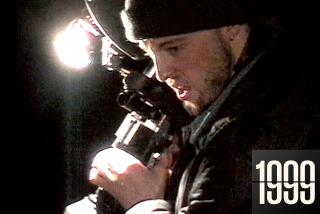Buzz on ‘Borat’ isn’t getting heard, but just wait
- Share via
“Buzz” is the most evil of buzz words in the modern entertainment vocabulary. It’s the hum in the air that hangs over a movie, book or TV show before the product ever reaches the audiences’ eyes.
Currently, movie buzz emanates from the mercantile Hollywood columnists who have invaded not just trade publications but also major dailies, as well as from inside dopesters on the Internet. Softer variations on buzz eventually appear on syndicated infotainment shows like “Access Hollywood” and “Entertainment Tonight.”
The terrific new “Borat: Cultural Learnings of America for Make Benefit Glorious Nation of Kazakhstan” acquired gigantic amounts of thumbs-up buzz when it hit the festival circuit this fall.
Its prime creator, Sacha Baron Cohen, invaded the Internet and international airwaves like a P.T. Barnum for the information age, suckering some unsuspecting viewers into believing that his Kazakh reporter Borat was a real, living, breathing troglodyte, then letting them in on the brilliant joke.
Apparently, this one-man shock wave of comedy wasn’t enough to get the attention of Middle America. After market research showed awareness of the film throughout the heart of the country was “soft,” 20th Century Fox cut the number of opening-day theaters from more than 2,000 to 700.
But if any recent film promises to be a magnet for smart collegiate audiences the way Woody Allen and Mel Brooks films were in the late 1960s and ‘70s, it’s “Borat.” What’s confusing the great minds of Hollywood is that they’ve forgotten the difference between buzz and what occurs when audiences actually see films: word of mouth.
The buzz phenomenon has nothing to do with the art or entertainment of the movies. It achieved hegemony as soon as the studios ceded their creative choices to their marketing and distribution arms and to publicity offices.
A movie that was viewed as feeble camp when it opened, “Urban Cowboy” (1980), had more positive buzz than a bee farm due to its hot star, John Travolta, and newspaper and magazine coverage of everything from C&W; bars to “suburban cowboy” fashions. Two decades later, a movie now increasingly seen as an overblown, clinical TV dramedy, “American Beauty,” became buzz-worthy because of one carefully targeted laudatory column from a New York Times show-biz analyst that ran on Fourth of July weekend when there was nothing else to write about. (The studio then stopped screening the picture for weeks, allowing the buzz to build; the New York Times column pushed that test-tube baby all the way to an Oscar win.)
By contrast, a now-iconic picture, “The Right Stuff” (1983), was considered a troubled movie in editorial meetings in Manhattan because a print wasn’t ready to show magazines with long lead times in New York. Even Steven Spielberg’s “E.T.” met with initial resistance at some offices because Spielberg had kept the buzz low, and the usual editorial geniuses suspected crowds wouldn’t swarm to see a cute-ugly alien and heroes young enough to ride bikes.
Obviously, buzz has never been foolproof (and with media journalism and movies, you’ve got to emphasize the “fool” in foolproof), but it’s become so pervasive that when a creation built on buzz fails, such as “Snakes on a Plane,” Hollywood is shocked. Movie-lovers, though, should be overjoyed: It’s a sign of audiences declaring their freedom from advertising, and from “soft” feature-writing that might as well be advertising.
From the start, the buzz on “Borat” was different from the buzz on “Snakes on a Plane”: Fox was promiscuously screening Cohen’s film -- not, as with “Snakes,” keeping it under wraps while promising prospective fans that the film would be rejiggered to give them exactly what they wanted. If the hum of great expectations hasn’t permeated into the red states, it’s probably because “Borat” can’t be summed up even in funny sound bites or jaw-dropping clips of a horrendously flawed antihero who (to quote another word-of-mouth hit, “Easy Rider”) “goes looking for America” and finds troubling pieces of it everywhere.
“Borat” may be the one recent movie of which it can be said: It must be seen to be believed. Once it is, people won’t stop talking about it. And that’s what you can’t buy with ads or generate with buzz: word of mouth.
*
Michael Sragow is a film critic at the Baltimore Sun, a Tribune company.
More to Read
The biggest entertainment stories
Get our big stories about Hollywood, film, television, music, arts, culture and more right in your inbox as soon as they publish.
You may occasionally receive promotional content from the Los Angeles Times.










